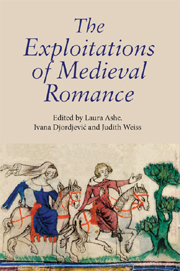Book contents
- Frontmatter
- Contents
- Preface
- Notes on Contributors
- Abbreviations and Editorial Note
- Introduction
- 1 The Fairies in the Fountain: Promiscuous Liaisons
- 2 Saracens and Other Saxons: Using, Misusing, and Confusing Names in Gui de Warewic and Guy of Warwick
- 3 The Exploitation of Ideas of Pilgrimage and Sainthood in Gui de Warewic
- 4 Chanson de geste as Romance in England
- 5 Patterns of Availability and Demand in Middle English Translations de romanz
- 6 Reading a Christian–Saracen Debate in Fifteenth-Century Middle English Charlemagne Romance: The Case of Turpines Story
- 7 Subtle Crafts: Magic and Exploitation in Medieval English Romance
- 8 Meeting Grounds: Gardens in Middle English Romance
- 9 ‘Als for the worthynes of þe romance’: Exploitation of Genre in the Buik of Kyng Alexander the Conquerour
- 10 Sir Gawain and the Green Knight and the Limits of Chivalry
- Index of Manuscripts
- General Index
4 - Chanson de geste as Romance in England
Published online by Cambridge University Press: 12 September 2012
- Frontmatter
- Contents
- Preface
- Notes on Contributors
- Abbreviations and Editorial Note
- Introduction
- 1 The Fairies in the Fountain: Promiscuous Liaisons
- 2 Saracens and Other Saxons: Using, Misusing, and Confusing Names in Gui de Warewic and Guy of Warwick
- 3 The Exploitation of Ideas of Pilgrimage and Sainthood in Gui de Warewic
- 4 Chanson de geste as Romance in England
- 5 Patterns of Availability and Demand in Middle English Translations de romanz
- 6 Reading a Christian–Saracen Debate in Fifteenth-Century Middle English Charlemagne Romance: The Case of Turpines Story
- 7 Subtle Crafts: Magic and Exploitation in Medieval English Romance
- 8 Meeting Grounds: Gardens in Middle English Romance
- 9 ‘Als for the worthynes of þe romance’: Exploitation of Genre in the Buik of Kyng Alexander the Conquerour
- 10 Sir Gawain and the Green Knight and the Limits of Chivalry
- Index of Manuscripts
- General Index
Summary
Chansons de geste have long been appropriated by national sentiment, although the nationality in question has traditionally been French, as in Robert Bossuat's stirring formulation about the Chanson de Roland in a volume of French literary history from the 1950s:
French in its origins, in the character of its protagonists, and in the nature of the sentiments it expresses, the Song of Roland is, more than any other poem, the true epic of France. Chivalric honour, the importance of one's word, love of the fatherland, and the glory of the Lord are its essential impulses. In it we sense the passionate soul of a youthful people stirring, ready to make every sacrifice to fulfil its destiny.
Undoubtedly chansons de geste did play an important role in France. They played an important – but different – role in insular literature, too. From the beginning of Anglo-Norman culture, the story of Roland at Roncesvalles was cultivated in England and used to bolster Norman cultural pride, to the extent that the mythically depicted Charlemagne who warred against the Saracens became imaginatively linked to the conqueror William as well as to the crusaders who took Jerusalem. The earliest manuscript evidence we have of the emergence of the chansons into written form suggests that it was largely in England that it first happened, as does the formal heterogeneity of those of insular origin. Yet in England, though widely read, chansons de geste never formed a separate genre, and evi-dence suggests they were not distinguished from romances.
- Type
- Chapter
- Information
- The Exploitations of Medieval Romance , pp. 57 - 72Publisher: Boydell & BrewerPrint publication year: 2010



